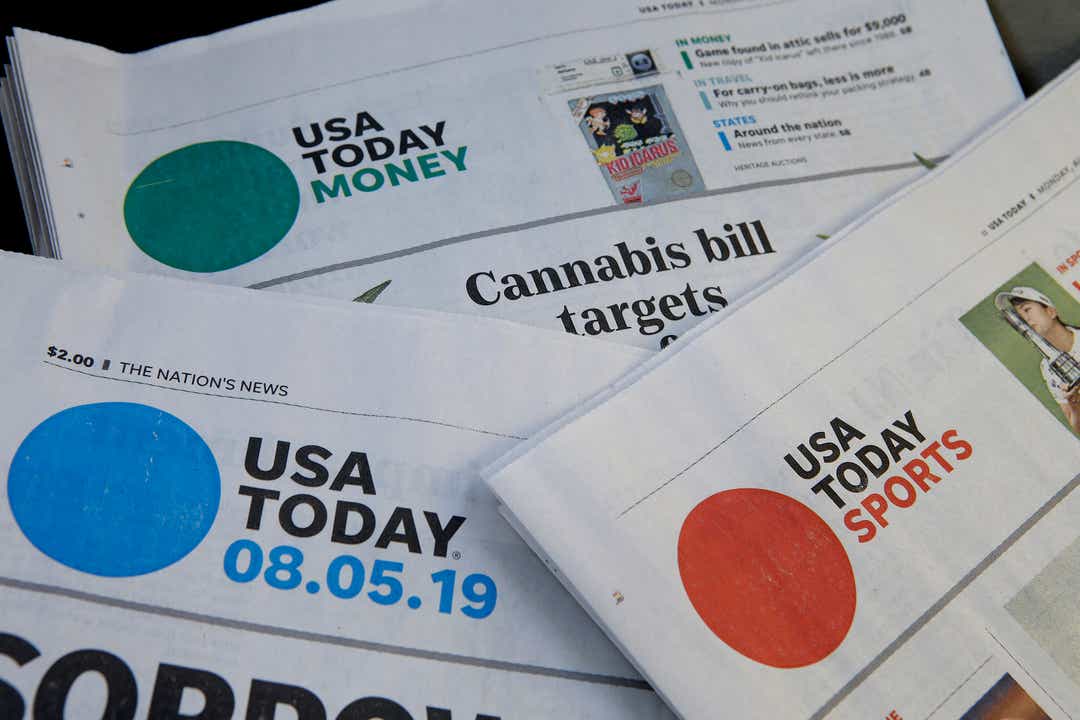The top executive at the biggest U.S. newspaper chain sought to calm fears of massive newsroom layoffs as New Media Investment Group Inc. closed its acquisition of Detroit Free Press owner Gannett Co.
In an interview, Michael Reed, who will be chief executive officer of the combined company, said the estimated $300 million in annual cost savings from the deal would come almost entirely from cuts outside of newsrooms, such as call centers, production facilities and back-office jobs.

“This synergy analysis – I can’t emphasize enough – is not focused on reducing journalists,” he said. “I view this as a chance to protect the newsroom costs that we have in both our companies because we now have all these other things we can do to reduce costs.”
Reed didn’t rule out some layoffs among the company’s reporters and editors, but he declined to say how many there might be. The new company, which will go by the Gannett name, has about 5,000 newsroom employees out of a total workforce of about 24,000.
“That doesn’t mean there won’t be a job here or there where there is duplication,” he said of the 261 daily media outlets. “If we have two people covering the exact same thing, we may need to reallocate that resource or reduce it.”
Further Erosion
In August, New Media sparked concerns that the deal’s cost cutting would further erode the country’s beleaguered local news market.
“This merger will hurt the communities these media organizations serve,” NewsGuild-CWA President Bernie Lunzer said in a statement this month. “To fund the merger, local papers will likely disappear, jobs will be slashed, and journalism will suffer.”
The deal unites what were already the two biggest U.S. daily newspaper chains. The new company will own more than one-sixth of all daily papers in the country, including USA Today. It will reach nearly 9 million print readers, according to industry analyst Ken Doctor.
Gannett investors have been pleased that the long-struggling newspaper chain found a buyer, sending shares up 14% this year. But New Media shareholders have been skeptical that the deal will pay off. Its stock has dropped 45% this year. Starting Wednesday, what had been New Media shares will trade under the Gannett ticker symbol, GCI.
This new industry behemoth arrives at a time when the future of local newspapers appears bleak. McClatchy Co. – which owns about 30 newspapers, including the Miami Herald and Charlotte Observer – is on the verge of bankruptcy, weighed down by pension obligations and debt. Unable to find a sustainable business model, the Salt Lake Tribune earlier this month became a nonprofit. Both New Media and Gannett reported revenue declines in the third quarter.
Downward Spiral
The newspaper industry has been in a downward spiral for years as the internet has upended its business model. Readers have moved online and get their news from social media, eroding print advertising sales. Facebook and Google, meanwhile, are gobbling up much of the online ad market. And many newspapers have eroded their quality by ordering deep cuts to their newsrooms, making it increasingly difficult to persuade readers to pay for online subscriptions.
The newly combined company has more than 820,000 digital subscribers. While that’s more than the 314,000 digital-only subscribers at Tribune Publishing Co.’s newspapers, a collection that includes the Chicago Tribune and Orlando Sentinel, it’s a far cry from the 4 million digital subscribers to the New York Times.
Paul Bascobert, who will be CEO of Gannett’s operating subsidiary, said he sees a long-term revenue opportunity in creating a platform for local businesses to reach consumers. Instead of searching Google for a local plumber or painter, Gannett readers could find all of them who paid to be on its platform, he said. Over time, he said, Gannett could build a business similar to Angie’s List, which operates a subscription service with reviews and ratings of local providers.
“Look at the market cap of all the companies that are doing that today,” Bascobert said in an interview, also citing HomeAdvisor and Care.com as models for Gannett. “It’s many, many billions of dollars.”
Bascobert is a former president of Bloomberg Businessweek, which – like Bloomberg News – is a unit of Bloomberg LP.
Future for Print
Bascobert said he still saw a future for print newspapers, even though McClatchy recently decided to end the Saturday print editions of all its newspapers starting next year. He also denied a recent report in Poynter.org that the company is considering discontinuing the print edition of USA Today.
“We’re going to continue to support that business as long as it continues to be profitable,” he said.
The deal further solidifies the power of private equity firms and hedge funds in the newspaper business. New Media is managed and controlled by private equity firm Fortress Investment Group. Private equity firms have been widely criticized for their growing ownership across the media industry, most recently during the turmoil at Deadspin.
Reed said the private equity industry was being treated unfairly.
“Private equity has money and our business needs capital for investment,” he said. “Private equity with the right intentions is not a bad thing.”
The Detroit News, which is owned by MediaNews Group, is in a joint operating agreement with Free Press owner Gannett. That partnership, known as Michigan.com, runs the combined business operations of the newspapers, including advertising, production and marketing.
Business - Latest - Google News
November 20, 2019 at 06:44AM
https://ift.tt/35hbDIY
Free Press owner Gannett plays down fears of massive layoffs as deal closes - The Detroit News
Business - Latest - Google News
https://ift.tt/2Rx7A4Y
Bagikan Berita Ini















0 Response to "Free Press owner Gannett plays down fears of massive layoffs as deal closes - The Detroit News"
Post a Comment